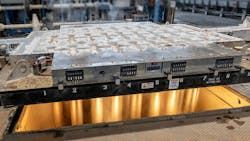Ford Motor Co. and General Motors Corp. are among 14 U.S. businesses petitioning the U.S. Dept of Energy to support development of a domestic supply for low/zero-carbon aluminum by allocating federal Inflation Reduction Act funds. Their message is timed to influence the selection of programs to be financed by DoE’s $6.3 billion Industrial Demonstrations Program, funded by the IRA and other federal infrastructure funds, to promote decarbonization projects for U.S. industries.
Others signing the letter to Energy secretary Jennifer Granholm include PepsiCo, electric vehicle producer Rivian, packaging giant Ball Corp., and solar panel producers SunEarth and SunPower.
“Today, primary aluminum production in the United States is in crisis,” they wrote in the letter, posted at www.buyaluminum.com and presented as a full-page ad in several newspapers. “While global demand for primary aluminum is forecast to grow over the coming decades, domestic primary aluminum production has continued to decline and is at risk of disappearing. Spiking electricity prices, lack of access to low-cost renewable energy, and insufficient federal investment have pushed the remaining six primary smelters to the brink.”
Demand for aluminum is expanding as automakers, the energy sector, and many other manufacturers adopt lightweight designs to fulfill their own emissions-reduction targets. Although aluminum is highly recyclable, and recycled aluminum reportedly comprises 65% of U.S. aluminum production, the rate of demand growth requires primary aluminum.
Most of the world’s primary aluminum is produced in China and Russia.
Primary aluminum is the product of an electrolytic process that converts alumina ore to molten metal. The high production cost, including the availability of large volumes of electricity plus environmental regulations, has driven a steady decrease in the number of domestic aluminum smelters from 23 in 1990 to six still in operation. Only one of those smelters relies on hydroelectric power.
In addition to the clean-energy dilemma, the Hall-Heroult electrolysis process for converting alumina to aluminum involves a carbon-dense anode; the electrolytic process releases CO2 and other gases, as does the anode-making process.
In short, decarbonizing the production of primary aluminum will require multiple technology replacement efforts.
The 14 companies delivering the letter maintain that federal support via the Inflation Reduction Act will help to expand the available of affordable, clean energy. Further, they argue that funding development of “clean primary aluminum production by assisting U.S. smelters to adopt renewable electricity sources, and to invest in new anode technology that eliminates CO2 emissions,” would support domestic job creation and promote the industrial decarbonization goals.
“The Inflation Reduction Act presents a powerful opportunity for the Department of Energy to prioritize American-made, clean sources of aluminum, which will in turn make more sustainable options available to companies like Ford,” stated Ford global director of sustainability, homologation and compliance, said Cynthia Williams. “It’s going to take all of us – manufacturers, suppliers, energy providers and government – working together to build a better future that’s not just good for business, but also for people and the planet.”
About the Author
Robert Brooks
Content Director
Robert Brooks has been a business-to-business reporter, writer, editor, and columnist for more than 20 years, specializing in the primary metal and basic manufacturing industries.
